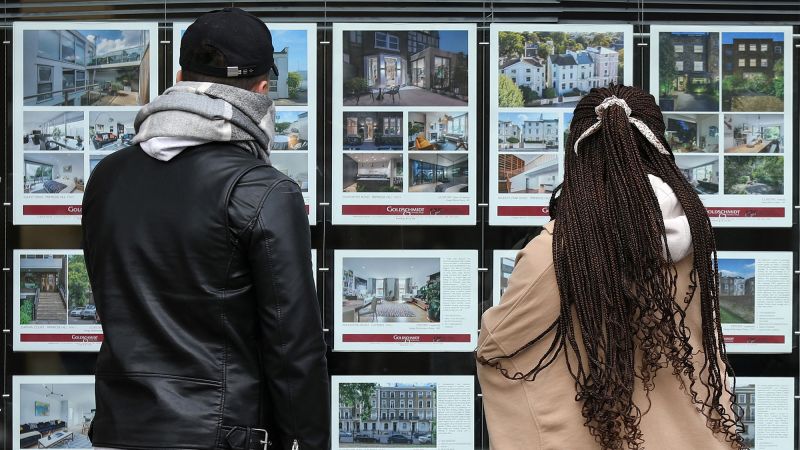Summarize this content to 2000 words in 6 paragraphs
Britons hoping to buy their first home face the most difficult conditions in 70 years, according to a new report released Monday.
First-time buyers are grappling with the twin challenges of historically high down payments and steep mortgage repayments, whereas many previous generations faced either one or the other, says the study by the Building Societies Association, a trade body whose members account for almost a quarter of all mortgage lending in the United Kingdom.
“Becoming a first-time buyer is expensive, possibly the most expensive it has been over at least the last 70 years,” the BSA report says. “During some periods both the cost of buying (down payments) and the cost of owning (mortgage repayments) have been high. This is the situation that many prospective first-time buyers now find themselves in.”
The analysis finds that the typical first-time buyer needs to stump up a down payment, or deposit, of around £60,000 ($74,000), rising to £144,000 ($178,000) in London, where “support from family appears almost essential.”
Meanwhile, rising mortgage rates have pushed repayments back up toward levels last seen during the period leading up to the global financial crisis, the report says.
Would-be buyers have struggled since the start of this century to keep up with surging house prices. According to the Office for National Statistics, average earnings in England and Wales have risen 70% since 2002, while house prices have jumped by 174%.
“At a national level, homes were affordable on average… until 2002, and not affordable after,” the ONS said.
The average mortgage repayment has rocketed since late 2021 as the Bank of England, along with other major central banks, began jacking up official interest rates to bring down inflation.
Then, about a year later, mortgage costs shot up again after then-Prime Minister Liz Truss unveiled her disastrous “mini-budget,” which included billions in unfunded tax cuts, sparking panic among bond traders over the sustainability of the UK’s public finances. (The interest rate on some government bonds is used to set mortgage rates).
On Monday, the average rate on a two-year fixed-rate mortgage stood at 5.82%, according to data from product comparison website Moneyfacts. That’s lower than the 15-year high of 6.85% hit in August last year, but still far above the 2.29% rate recorded in November 2021, the month before the Bank of England started raising interest rates.
The BSA report, citing data from UK Finance, an association of banks and other financial service providers, says the typical first-time buyer paid 22.5% of their gross monthly income on mortgage repayments in November last year, up from 16.8% in March 2022.
The sharply higher repayments are “a big barrier to home ownership,” the report says.
As a result, getting onto the housing ladder increasingly requires two higher-than-average incomes as well as support from parents. That has excluded many potential buyers — such as single people and those without financial help from their families — from home ownership, the analysis finds.
One of the consequences has been to keep many people “stuck” in private rented accommodation.
There, too, residents are being squeezed: Preliminary data from the ONS, published last week, showed that the average rent rose 9.2% in the year to March — the highest annual increase since the body started collecting the data in 2015.
“An election is due within the next year and a new government, committed to helping prospective first-time buyers, might start by acknowledging the challenges younger generations face not just in housing but more generally,” the BSA said.













